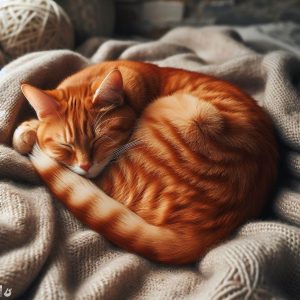It can be very worrying when your usually energetic and playful cat starts acting lethargic and weak. A sudden change in behavior or energy levels in cats often signifies an underlying health issue. As cat owners, it’s important we learn to identify when our feline friends are feeling under the weather and seek veterinary help if needed.
In this comprehensive guide, we’ll explore the top reasons for sudden lethargy and weakness in cats. You’ll also learn the symptoms to watch out for, tips on examining your cat at home, when to call the vet, and how to care for a lethargic cat. Let’s get right into it!
Common Causes of Sudden Lethargy and Weakness in Cats
There are several potential reasons why your cat may start displaying lethargic and weak behavior seemingly out of the blue. Here are some of the most common causes:
Illness or Disease
Cats are masters at hiding pain and discomfort. So by the time you notice lethargy or other symptoms, your cat may already be quite sick. Some common feline illnesses that cause lethargy include:
- Upper respiratory infections – Caused by viruses or bacteria, URI in cats produces flu-like symptoms. Your cat may have discharge from eyes/nose, fever, poor appetite and low energy.
- Urinary tract infections (UTI) – Bacterial infections of the urinary tract cause painful urination, blood in urine, excessive licking of genitals, and lethargy.
- Kidney Disease – Kidney disorders can make cats feel unwell and weak. It can also cause vomiting, diarrhea, weight loss, and bad breath.
- Diabetes – About 1 in 200 cats suffer from diabetes. It can cause increased thirst, lethargy, weight loss, and other problems.
- Feline Leukemia Virus (FeLV) – It’s a viral infection that can suppress the immune system and cause anemia, weight loss, diarrhea, and lethargy.
- Feline Immunodeficiency Virus (FIV) – Another cat-specific viral infection, FIV attacks the immune system and causes recurrent illness, infections, and fatigue.
- Cancer – Feline cancers like lymphoma can produce nonspecific symptoms like lethargy, weight loss, poor appetite, vomiting, and more.
If your cat’s lethargy persists beyond a day or two, it’s wise to have your vet run some diagnostic tests to pinpoint any underlying illness. Prompt treatment can help prevent complications and deterioration of your cat’s condition.
Pain or Injury
Sudden lethargy and weakness may also stem from an injury, accident or fall. Cats are great at hiding their pain. Sprains, fractures, sore joints from arthritis, dental issues, wounds or abscesses can all make your cat feel weak and lifeless.
Watch for signs like limping or stiffness, yelping when touched or moved, lack of grooming, appetite changes and irritability. Check for any signs of injury on the body. Seek veterinary care to diagnose the issue and provide pain relief medication to your cat. Restrict activity and allow for rest and recovery.
Poisoning
Cats can accidentally ingest toxic substances like antifreeze, rat poison, household cleaners, toxic plants, etc. This can cause a wide range of symptoms from vomiting, diarrhea, trembling, seizures to lethargy, weakness and collapse.
If poisoning is suspected, take your cat to the emergency vet clinic immediately. Quick action is crucial. Try to take along details of any potential poisons or toxins your cat may have consumed. Prompt treatment greatly improves recovery.
Poor Nutrition
Deficiencies of key nutrients like proteins, vitamins and minerals can leave your cat feeling weak and lifeless. Underfeeding, limited diet, spoiled/rancid food, or sudden diet change can disrupt your cat’s nutrition.
Look for other signs like weight loss, dull coat, vomiting, diarrhea, loss of appetite and more. Have your vet evaluate your cat’s diet and overall health. Switch to a balanced, high-quality cat food recommended for your cat’s age and activity level.
Dehydration
Dehydration is another common cause of sudden lethargy in cats. Factors like fever, vomiting, diarrhea, diabetes, kidney disease, etc. can result in fluid loss and dehydration. Left untreated, it can be life-threatening.
Check for dry gums, lethargy, loss of skin elasticity, sunken eyes, and other dehydration symptoms. Try offering your cat wet food and broths to increase fluid intake. Serious cases may need subcutaneous or intravenous fluids from the vet.
Extreme Weather
Extreme heat or cold can also result in weakness and fatigue in cats. Senior cats and kittens can be more vulnerable. Know your cat’s limits when it comes to hot or cold temperatures.
Provide cool, shaded areas in summers. Ensure adequate heating in winters. Limit outdoor access in extreme weather. Look for panting, vomiting, diarrhea and lethargy. Move your cat to a comfortable area and contact your vet if concerns arise.
Medication Side Effects
Reactions and side effects from new medications can sometimes cause lethargy as well. Usually, these fade as your cat’s body adjusts to the medication. But do consult your vet if lethargy worsens or persists beyond a few days.
Stress or Anxiety
Sudden changes to their environment, routines, or household can trigger stress in cats. Exposure to new people, pets, loud noises can also cause anxiety. This stress takes a physical toll and may result in lethargy, appetite changes, hiding away, restless behavior, and more.
Try to minimize disruptions and maintain a calm environment. Use calming aids like pheromone diffusers. If stress symptoms persist, speak to your vet about anti-anxiety medication. Also ensure that your cat feels safe and secure in your home.
When to See the Vet for Lethargy and Weakness
While short bouts of lethargy can sometimes resolve on their own, it’s always best to keep an eye out and contact your vet if you notice:
- Lethargy lasting more than 24 hours
- Significant decrease in energy levels
- Minimal interest in food and water
- Weakness or wobbliness
- Labored breathing
- Pale gums
- Weight loss
- Fever – normal cat temperature is 100- 102.5° Fahrenheit
- Lack of response to stimuli
- Other accompanying symptoms like vomiting, injury, etc.
Puppies and kittens can deteriorate rapidly. Seek prompt veterinary care if you notice anything unusual. Early treatment is key, so don’t wait too long before calling your vet.
How to Check Your Lethargic Cat at Home
While waiting for your vet appointment, keep a close eye on your weak cat and monitor any symptoms. Here are some tips on examining your lethargic cat at home:
Check temperature – Use a pet thermometer to check if kitty has a fever, which indicates infection or inflammation. Normal temperature is 100-102.5°F.
Monitor bathroom habits – Note if your cat is urinating and defecating normally. Changes can indicate issues like UTI, kidney problems, dehydration, etc. Check litter box for blood, straining, discomfort.
Weigh your cat – Sudden weight loss is a key sign of ill health. Use a pet scale to check for weight changes. Monitor if your cat is eating and drinking normally.
Look for injury – Part the fur and check your cat’s body for any signs of injury, swelling, cuts, rashes, pain. Also check ears, nose, mouth, paws and tail.
Check hydration – Lift skin on the back of your cat’s neck and see if it snaps back. Sunken eyes, dry nose, and gums also indicate dehydration.
Assess activity – Note if your cat can move around comfortably. Does kitty still jump onto furniture or seem weak/wobbly? Any limping or stiffness?
Check breathing – Count breathing rate per minute. Fast, labored breathing indicates respiratory distress and needs urgent vet care.
Check gum color – Lift lips and check gums. Pink shows good circulation. Pale, white, or blueish gums signify anemia or impaired blood flow.
Monitoring these basic parameters at home provides useful insights on your cat’s condition. Always reach out to your vet for guidance on next steps.
Caring for Your Lethargic Cat
While nursing your weak, ill cat back to health, here are some tips for providing care at home:
- Set up a quiet, comfortable area with soft bedding, litter box, food, water nearby.
- Try tempting with smelly foods like tuna, broths, canned pate. Avoid hard kibble if uninterested.
- Add extra water to make food mushy. Feed by hand if needed.
- Use shallow dishes and elevated stands to make eating and drinking easier.
- Help kitty move around gently if needed. Restrict stairs/jumping.
- Administer any medications prescribed by the vet.
- Monitor appetite, energy levels, bathroom habits, and report concerns.
- Offer affection and reassurance if your cat seems distressed.
- Avoid overstimulation with toys, noise, other pets. Allow for rest.
- Keep the environment clean, warm, and calm. Limit disruptions.
With some TLC and close monitoring, most cats bounce back quickly once treatment begins. But always follow your vet’s guidance on nursing your lethargic cat. Seek immediate help if you notice any worsening or new symptoms cropping up.
Finding the Underlying Cause
As seen above, there are numerous possible reasons for sudden weakness and fatigue in cats. While scary, try not to panic. Start by observing your cat closely and making note of all symptoms and changes.
Share your detailed observations with your vet. Based on this, your vet will advise diagnostic tests to pinpoint the exact cause. Urine and blood tests, imaging scans, cultures, biopsies and more may be recommended.
Identifying any infection, disease, toxicity, injury, malnutrition, or other factors causing your cat’s lethargy is crucial. This allows tailored treatment to be initiated promptly to manage the condition, minimize complications, and restore your cat’s health.
With attentive care from you and targeted treatment by the vet, most cats suffering from lethargy and weakness can make a full recovery. But it’s vital to seek timely veterinary assistance at the very first signs of ill health in your kitty companion.
FAQs about Lethargy and Weakness in Cats:
How long can a cat go without eating?
Healthy adult cats can go 1-2 weeks without food. Kittens can only go a few days as they lack reserves. But prompt vet care is advised if your cat stops eating for over 48 hours.
Are lethargic cats in pain?
Lethargy often signals underlying pain or discomfort in cats. But as predators who mask vulnerability, cats rarely vocalize. Look for other signs like limping, restlessness, aggression, hiding away, lack of grooming, appetite changes etc.
Why is my old cat so lethargic?
Senior cats can often turn lethargic due to age-related conditions like arthritis, dental disease, cancer, kidney failure, hyperthyroidism, vision issues, cognitive dysfunction. Increased veterinary care is needed to manage geriatric health issues.
When should you start to worry about a lethargy cat?
Contact your vet promptly if lethargy lasts over 24 hours or is accompanied by other symptoms like labored breathing, weakness, vomiting, diarrhea, weight loss. Kittens and senior cats need urgent evaluation.
Can cats recover from lethargy?
Yes, with proper treatment most cats can recover fully from lethargic episodes. Underlying issues must be diagnosed and managed, e.g. infections treated with antibiotics and fluids, injuries immobilized. Nutrition and hydration support is also key.
The Takeaway
We hope this guide gave you a thorough overview regarding sudden lethargy and weakness in cats. While it can be very distressing to see your energetic kitty slow down, try not to panic.
Monitor symptoms closely, safety kitty-proof your home, follow veterinary guidance, and provide attentive TLC. With the remarkable resilience and survival ability of cats, the outlook is promising. So focus on swift diagnosis and prompt care to get your precious feline family member purring happily once again!



